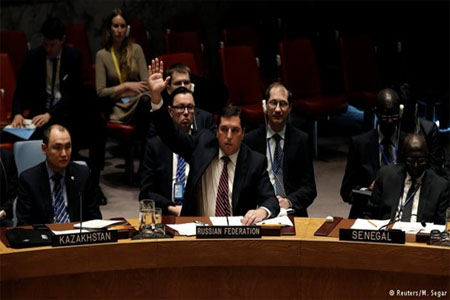
Afrasianet - Moscow has vetoed a US-backed resolution condemning the Khan Shaykun incident on April 4 as a chemical attack while demanding that Syria open up its military bases to inspections.
Russia, which has veto power as one of the five permanent members of the UN Security Council, was joined by Bolivia in voting down the resolution. China, Ethiopia and Kazakhstan abstained.
Ten states, including the US, the UK and France – the Troika that put together the text of the resolution – voted in favor.
“The main objection to the resolution is that it apportioned blame prior to an objective outside investigation of the incident... The outcome of the vote was predestined, because we disagreed categorically with a document that was fundamentally misconceived,” said Vladimir Safronkov, Russia’s deputy envoy at the Security Council, who also accused other states and international organizations of making “no effort” to inspect the site of the alleged attack.
Accepting the resolution would also “legitimize” the April 7 air strike carried out by the US on the Shayrat airbase in northern Syria, from which Washington claims government planes carrying the deadly sarin nerve gas took off, Safronkov said.
Britain’s representative Matthew Rycroft said Russia’s veto – the eighth since the Syrian conflict began in 2011 – was "indefensible," and reminded Moscow of its own promise to rid the country of chemical weapons following an alleged attack in 2013.
France's President Francois Hollande said Moscow was taking on a "heavy burden of responsibility" for "obstructing" the efforts to end the Syrian crisis.
Washington's envoy to the Security Council, Nikki Haley, noted she was still hopeful of future cooperation with Moscow, and urged Russia to exert its influence over Bashar Assad to stop the "madness and violence" of the conflict, in which over 400,000 people are estimated to have been killed.
Unlike the earlier drafts of the resolution on the alleged incident, the final document did not lay the blame for it on Damascus. It also referred to the incident as the “reported use of chemical weapons” rather than stating that such use did take place as a fact.
However, the draft leaned heavily on the Syrian government in terms of demands to submit to an investigation of the incident. It said inspectors chosen by the UN and the Organization for the Prohibition of Chemical Weapons (OPCW) must be given prompt and unrestricted access to “any and all sites” they choose, provided with flight plans and logs they request, and given the names of military officers “in command of any aircraft” they probe.
Damascus would also have to “arrange meetings requested, including with generals or other officers, within no more than five days of the date on which such meeting is requested.”
In the event of non-compliance with the terms, Syria could be exposed to military action mandated by the UN Security Council under Chapter VII of the UN Charter.
The rebel forces controlling Khan Shaykhun were only asked to “provide delay-free and safe access” to the site of the reported incident.
The data which, according to the US, “purports to be evidence [of the Syrian government chemical attack]” is “very flimsy” and “relies on mainly open source materials, by which they [the US] mean evidence from jihadi sources, evidence from al Nusra [Front] and what they called the social media,” the former British ambassador to Syria, Peter Ford, told RT.
RT

